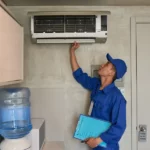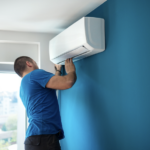Air conditioning is a staple in many homes, providing much-needed relief during hot summer months. While it’s great for maintaining a comfortable indoor temperature, it also plays a significant role in air conditioner air quality. Let’s explore how air conditioning affects the air we breathe inside our homes.
The Benefits of Air Conditioning
The air quality of air conditioners plays a crucial role in ensuring a healthy and comfortable indoor environment. Here are the benefits of using air conditioners in improving your home’s indoor air quality:
1. Humidity Control
One of the key functions of air conditioning is to manage humidity levels. High humidity can create an uncomfortable environment and promote the growth of mold and mildew. When humidity is reduced, air conditioners help prevent these issues, contributing to healthier indoor air.
Maintaining optimal humidity levels (generally between 30-50%) can also reduce the proliferation of dust mites, which thrive in more humid conditions, and can alleviate allergies and asthma. Proper humidity management is essential for maintaining the air quality of your air conditioning system and ensuring a healthier living space.
2. Air Filtration
Modern air conditioning systems are equipped with filters that capture dust, pollen, and other airborne particles. This filtration is particularly beneficial for individuals with allergies or respiratory conditions. Regularly changing or cleaning these filters ensures that your air conditioner’s air quality remains high by continuously removing contaminants. Some advanced systems also feature electrostatic or UV filters, which can capture even smaller particles and neutralize bacteria and viruses, offering an extra layer of protection.
3. Ventilation and Fresh Air Circulation
Many advanced air conditioning systems are designed to improve ventilation by bringing in a certain amount of fresh air from outside. This helps to dilute indoor air pollutants and enhances your air conditioner’s air quality. Good ventilation is essential for removing indoor pollutants like volatile organic compounds (VOCs) from household products, cooking odors, and even carbon dioxide that builds up from human occupancy.
4. Temperature Control and Comfort
While primarily designed for cooling, air conditioners also play a role in maintaining a comfortable and consistent indoor temperature. Extreme temperatures can stress the body, particularly in the very young, elderly, or those with health issues.
When you keep the indoor environment at a stable, comfortable temperature, air conditioning can reduce stress on the body and contribute to overall well-being. In addition, maintaining the air quality of air conditioners ensures that the cooled air is not only comfortable but also healthy to breathe, further enhancing the benefits of a well-regulated indoor climate.
5. Odor Reduction
Air conditioners can help reduce unpleasant odors within the home. By circulating and filtering the air, they remove particles that cause odors from pets, cooking, smoke, or other sources. Some systems are equipped with activated carbon filters specifically designed to neutralize odors and improve the overall smell of your indoor air.
Potential Downsides
Despite its benefits, air conditioning can have some negative effects on indoor air quality if not properly maintained.
1. Recirculation of Pollutants
Air conditioners often recirculate indoor air. If your home is well-sealed and lacks adequate ventilation, pollutants such as chemicals from cleaning products, off-gassing from furniture, and pet dander can build up. This can lead to stale, unhealthy air and negatively impact the air quality of air conditioning.
2. Dirty Filters
Filters in air conditioners need regular maintenance. If they become clogged with dirt and debris, they can no longer effectively trap pollutants. In fact, dirty filters can become a source of contaminants themselves, negatively affecting the air quality of air conditioners and allowing particles to circulate back into your home.
3. Mold and Mildew
While air conditioners help control humidity, they can also create conditions conducive to mold and mildew growth if not properly maintained. Condensation can accumulate in the unit or ducts, providing a breeding ground for mold. This can negatively impact air conditioner air quality, as inhaling mold spores can be harmful to your health.
Tips for Maintaining Indoor Air Quality
To ensure that your air conditioning system positively impacts indoor air quality, consider the following tips:
1. Regular Maintenance
Not regularly maintaining and cleaning your air conditioners can not only damage your unit but also lead to significant costs. Schedule regular maintenance for your air conditioning unit. A professional can inspect the system, clean components, and check for issues, ensuring it runs efficiently and keeps your air clean.
2. Change Filters Regularly
Check and change your AC filters regularly. The frequency depends on factors such as usage, presence of pets, and household allergies. Typically, filters should be changed every 1-3 months.
3. Use High-Quality Filters
Invest in high-efficiency particulate air (HEPA) filters, which trap smaller particles more effectively than standard filters. High-quality filters can significantly improve the air you breathe.
4. Ensure Proper Ventilation
While it’s important to keep your home energy-efficient, allowing for some fresh air exchange is crucial. Open windows occasionally or use exhaust fans to introduce fresh air. Some HVAC systems include built-in ventilation options—ask your HVAC professional about these features.
5. Keep Ducts Clean
Dust and debris can accumulate in your ductwork, which can then circulate into your living spaces. Periodic duct cleaning can prevent this issue. Also, check for any leaks or damage in the ductwork that could compromise air quality.
6. Control Moisture
Be proactive about managing moisture in your home. Use dehumidifiers in damp areas, promptly fix leaks, and ensure your AC’s condensate drain is functioning correctly. Controlling moisture helps prevent mold and mildew growth.
Take Proactive Measures to Maintain Indoor Air Quality
Air conditioning can significantly impact indoor air quality, both positively and negatively. By maintaining your system properly and taking proactive measures, you can ensure that the air quality of air conditioning units is suitable for your family’s health.
For more information about your air conditioning and how it impacts indoor air quality, be sure to check out our other blogs.
Need to maintain your air conditioners for better indoor air quality? Contact our experts today!






